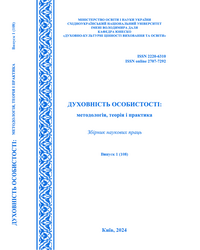USE OF EDUCATIONAL TASKS AND EXERCISES FOR THE FORMATION OF OPERATIONAL SKILLS OF STUDENTS OF SCIENTIFIC LYCEUMS IN THE PROCESS OF RESEARCH ACTIVITIES
DOI:
https://doi.org/10.33216/2220-6310/2024-109-2-181-196Keywords:
operational skills, linguistically gifted students of scientific lyceums, educational task, exercise, typology of exercises, creative tasks, Task-Based Learning technologyAbstract
The article analyzes educational tasks and exercises that are used to form operational skills of students of scientific lyceums engaged in research activities. It has been proven that the variety of educational and cognitive tasks offered to intellectual students depends on the educational subjects, their place in the academic process, the age development of lyceum students and their desire to creatively approach the solution of the tasks.
Educational tasks and their varieties, such as exercises and tasks used in the research activity of lyceum students, were also analyzed. The following types of educational tasks are distinguished: interactive tasks, educational games, test tasks, software tasks, project tasks, individual scientific and research tasks, etc. The main functional areas of educational research tasks for the formation of operational skills of students of scientific lyceums are highlighted, such as: informational, cognitive, systemizing, developing.
It was found that among theorists and practitioners in the field of didactics there is no single approach to building a classification of exercises, which by their nature are divided into oral, written, graphic, and the number of exercises included in a certain educational task depends on the individual characteristics of students, their level of proficiency subject and quantitative and qualitative parameters of their performance. At the same time, for the effective formation of operational research skills of lyceum students, it is necessary to actively apply complexes of various types of exercises, including creative ones, which contribute to faster training to solve tasks of a scientific, design, technological direction: carry out analysis, synthesis of educational material, think by analogy, abstract from irrelevant factors , generate non-standard creative ideas, forecast and evaluate performance results. The article also analyzes the main didactic methods of teaching using the Task-Based Learning technology and identifies the features of using educational tasks during the study of foreign languages, based on the results of experimental work with linguistically gifted lyceum students.

